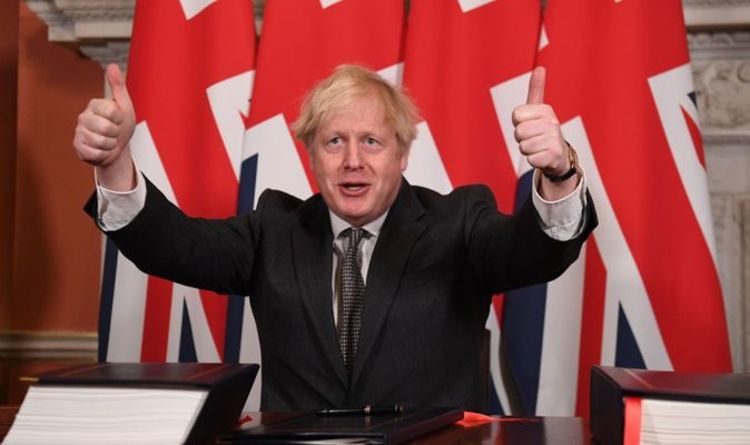

The Global Britain Commission is set to publish its report on how to turbocharge the British economy in the coming week. The Commission was the brainchild of Dr Liam Fox who launched his unitive last October. It boasts leaders from some of the UK’s largest corporations such as Virgin Atlantic, Heathrow, EY, Mace and Forth Ports.
One of the central ideas of the Commission panel is to turbocharge British exports.
Panel members claim in their report that if Brexit Britain increased exports per capita to equal those of Germany, then the country would add an extra £474 billion each year to its earnings.
Sir Roger Marsh, a Global Britain Commissioner, claimed that the plan would restore Britain’s reputation as a Global trading giant and help Boris Johnson’s ambitions to “level up” the country.
The chairman of NP11, a public-private partnership for business in northern regions, said: “‘It’s a restatement of Britain’s prowess when it comes to being a global trading nation.
“Candidly, all of this is about progressively eradicating poverty and deprivation.
“The prize is all about better lives for all, better health outcomes, better life expectancy and this is the fuel.
“This economic success… will help us towards that, because that is what this is all about.
“It’s not just for the sake of it, it’s the ultimate prize and the outcome of a global Britain.”
The UK currently lags behind Germany on the metric of exports of goods and services per capita.
Figures show that in 2020 goods and services exports in the UK came to about £8,597 per capita compared with £15,645 in Germany.
READ MORE: ‘F**k off and lose weight’ Labour MP barred from bar after Brexit rant
The Commissioners argue that increasing trade will create more export-related jobs, which can pay up to seven percent more than the current average UK wage.
This means workers could expect an average salary of £33,475, compared with the national average of £31,285 – a potential pay rise of £2,190, according to the report.
Dr Fox welcomed the report’s findings, saying it had helped to highlight the business opportunities that exited now that the UK had unshackled itself from the European Union.
“What is abundantly clear is that the right focus on a truly global Britain can reap huge economic benefits for everyone in the UK,” he said.
“Post-Brexit, there is a new trading reality, and British and global businesses can grasp these new opportunities to the benefit of the economy, business and workers.”
DON’T MISS
DUP leader accuses Boris of failing to address hated Brexit deal [SPOTLIGHT]
Boris giving ex-Brexit Sec Barclay top job ‘desperate last resort’ [REVEALED]
Brexit: UK flexes muscles as Truss threatens Putin with sanctions [INSIGHT]
The British Government has signed a raft of new trade deals since leaving the EU.
These include a new agreement with Australia, as well as “rollover” deals that allowed trade with more than 60 signatory countries to continue on similar terms to those enjoyed when the UK was still a member of the EU.
However, the Office For Budget Responsibility estimates that Brexit will have a negative impact of 4 percent on UK GDP over the longer term.
David Henig, a trade expert, argued that Brexit has seriously hampered the ability of UK companies to trade their goods outside of Britain.
“U.K. companies have no markets in which it is now easy to trade,” he told Politico.
The UK director of the European Centre for International Political Economy added: “Faced with harder trade with the EU, companies will look towards other options globally.
“But those won’t ever be as easy as trade with the EU used to be, so it’s still going to be difficult.”





More Stories
“It’s All About Value” – Inside the Bailie Hotel’s Unbeatable Rates
Uncover the Mysteries: Detective Pack’s New Jack the Ripper Tour Debuts in London’s Whitechapel
Local Gem in Bailieborough : Rave Reviews for The Bailie Hotel with Irish Hospitality